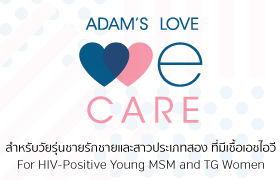What is HIV?
HIV is the human immunodeficiency virus. It is the virus that can lead to acquired immune deficiency syndrome, or
AIDS. UNAIDS estimates over half a million people in Thailand are living with HIV, and in 2009 28,000 people died from AIDS. HIV damages a person’s body by destroying specific blood cells, called CD4+ T cells, which are crucial to helping the body fight diseases.
HIV is spread primarily by:
- Not using a condom when having sex with a person who has HIV. All unprotected sex with someone who has HIV contains some risk.
- Unprotected anal sex is riskier than unprotected vaginal sex.Among men who have sex with other men, unprotected receptive anal sex is riskier than unprotected insertive anal sex.
- Having multiple sex partners or the presence of other sexually transmitted diseases (STDs) can increase the risk of infection during sex. Unprotected oral sex can also be a risk for HIV transmission, but it is a much lower risk than anal or vaginal sex.
- Sharing needles, syringes, rinse water, or other equipment used to prepare illicit drugs for injection.
- Being born to an infected mother—HIV can be passed from mother to child during pregnancy, birth, or breast-feeding.
Only a test can tell if you have HIV. If you do, this is described as being HIV-positive.There is no cure for HIV. However, there are more than 20 anti-HIV drugs, and treatment with a combination of these drugs can mean a longer and healthy life.
REMEMBER: Early diagnosis and treatment are essential for maintaining your health. Take control of your health and your life.
SOURCE
: CDC.GOV, AIDS.ORG

















